
Posted in Current Events, Editor's Note with tags Dieu Cay, Election 2012,President Obama, World Press Freedom Day by Ian Pham
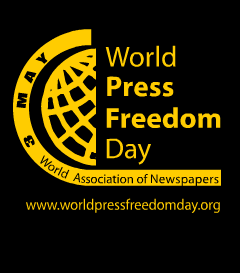 Over one month ago, on May 3, 2012, a world celebration known as World Press Freedom Day was held in Carthage, Tunisia. Many world leaders delivered messages of celebration and commemoration that day, including President Barack Obama. The President included many prominent names in his statements. One of which was Dieu Cay, a well known democracy activist imprisoned by the Vietnamese government since 2008.
Over one month ago, on May 3, 2012, a world celebration known as World Press Freedom Day was held in Carthage, Tunisia. Many world leaders delivered messages of celebration and commemoration that day, including President Barack Obama. The President included many prominent names in his statements. One of which was Dieu Cay, a well known democracy activist imprisoned by the Vietnamese government since 2008.
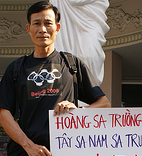 Dieu Cay is the pen name for Vietnamese blogger and freedom activist Nguyen Van Hai. He has been detained by the Communist government in Vietnam since 2008 for protesting China’s actions in Tibet, the Spratly Islands, and criticizing the country’s Olympic torch relay. Idiotically, yet unsurprisingly, the Vietnamese government imprisoned Dieu Cay under the charges “tax evasion”, which is bogus to say the least.
Dieu Cay is the pen name for Vietnamese blogger and freedom activist Nguyen Van Hai. He has been detained by the Communist government in Vietnam since 2008 for protesting China’s actions in Tibet, the Spratly Islands, and criticizing the country’s Olympic torch relay. Idiotically, yet unsurprisingly, the Vietnamese government imprisoned Dieu Cay under the charges “tax evasion”, which is bogus to say the least.
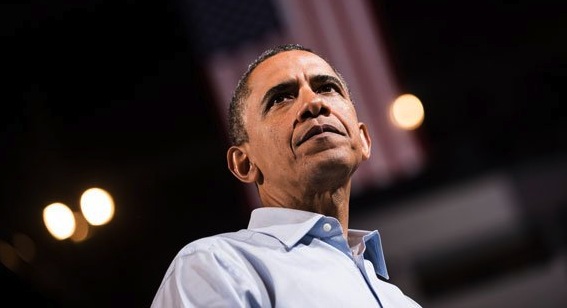 We have said in the past that the president listens, now we know that he listens. Not only does the president listen however, but he also speaks. Whether you recognize it or not, President Obama wants the votes of Vietnamese Americans, and is now starting to reach out to the Vietnamese community in the U.S. As members of a proud and democratic nation, we can help foster this movement by exercising our democratic rights. It’s election season, people. Let’s show the candidates that we got the vote.
We have said in the past that the president listens, now we know that he listens. Not only does the president listen however, but he also speaks. Whether you recognize it or not, President Obama wants the votes of Vietnamese Americans, and is now starting to reach out to the Vietnamese community in the U.S. As members of a proud and democratic nation, we can help foster this movement by exercising our democratic rights. It’s election season, people. Let’s show the candidates that we got the vote.
 Over one month ago, on May 3, 2012, a world celebration known as World Press Freedom Day was held in Carthage, Tunisia. Many world leaders delivered messages of celebration and commemoration that day, including President Barack Obama. The President included many prominent names in his statements. One of which was Dieu Cay, a well known democracy activist imprisoned by the Vietnamese government since 2008.
Over one month ago, on May 3, 2012, a world celebration known as World Press Freedom Day was held in Carthage, Tunisia. Many world leaders delivered messages of celebration and commemoration that day, including President Barack Obama. The President included many prominent names in his statements. One of which was Dieu Cay, a well known democracy activist imprisoned by the Vietnamese government since 2008.
In the words of President Obama,
“As we condemn recent detentions of journalists like Mazen Darwish, a leading proponent of free speech in Syria, and call for their immediate release, we must not forget others like blogger Dieu Cay, whose 2008 arrest coincided with a mass crackdown on citizen journalism in Vietnam, or journalist Dawit Isaak who has been held incommunicado by the Eritrean government for over a decade without formal charge or trial.”
 Dieu Cay is the pen name for Vietnamese blogger and freedom activist Nguyen Van Hai. He has been detained by the Communist government in Vietnam since 2008 for protesting China’s actions in Tibet, the Spratly Islands, and criticizing the country’s Olympic torch relay. Idiotically, yet unsurprisingly, the Vietnamese government imprisoned Dieu Cay under the charges “tax evasion”, which is bogus to say the least.
Dieu Cay is the pen name for Vietnamese blogger and freedom activist Nguyen Van Hai. He has been detained by the Communist government in Vietnam since 2008 for protesting China’s actions in Tibet, the Spratly Islands, and criticizing the country’s Olympic torch relay. Idiotically, yet unsurprisingly, the Vietnamese government imprisoned Dieu Cay under the charges “tax evasion”, which is bogus to say the least.
Following his release in 2010, Dieu Cay continued to express his opinions on his blog, before being harassed and imprisoned by the Communist Police once again. To this day, blogger Nguyen “Dieu Cay” Van Hai is still serving time in Vietnamese jail for charges of “conducting propaganda against the state”. He is currently facing a possible 20 years in prison, unless he pleads guilty to the bogus charges and concedes to the Communists. International pressure on the Vietnamese government may help reduce this sentence, as Dieu Cay refuses to plead guilty.
It is a wonder what caught the attention of President Obama to Vietnam’s current human rights situation. Though it is true that he was aware of the matter, he had yet to publicly speak out in defense of a single dissident, until May 3, that is. One very viable possibility, is the recent surge of information and momentum made possible by Mr. Truc Ho, the White House petition, and the music of Viet Khang.
 We have said in the past that the president listens, now we know that he listens. Not only does the president listen however, but he also speaks. Whether you recognize it or not, President Obama wants the votes of Vietnamese Americans, and is now starting to reach out to the Vietnamese community in the U.S. As members of a proud and democratic nation, we can help foster this movement by exercising our democratic rights. It’s election season, people. Let’s show the candidates that we got the vote.
We have said in the past that the president listens, now we know that he listens. Not only does the president listen however, but he also speaks. Whether you recognize it or not, President Obama wants the votes of Vietnamese Americans, and is now starting to reach out to the Vietnamese community in the U.S. As members of a proud and democratic nation, we can help foster this movement by exercising our democratic rights. It’s election season, people. Let’s show the candidates that we got the vote.
For the full statement by President Obama on Press Freedom Day, May 3, 2012, click here:
Posted in Current Events, Editor's Note with tags Cam Ranh Bay, Leon Panetta, Paracel and Spratly, South China Sea, Southeast Asia Sea, The Pentagon, Vietnam War on June 5, 2012 by Ian Pham
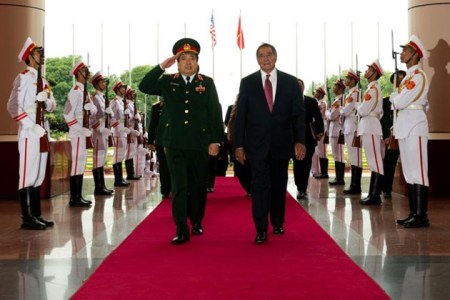 This past Sunday, U.S. Secretary of Defense, Leon Panetta paid a visit to Vietnam’s Cam Ranh Bay, a major U.S. base used during the Vietnam War. The visit yielded agreements between the U.S. and Vietnam to open restricted military sites in Vietnam that would permit searches for MIA soldiers of the war. Behind these agreements however, is the continuation of a deeper goal, the further normalization of relations between two former enemies.
This past Sunday, U.S. Secretary of Defense, Leon Panetta paid a visit to Vietnam’s Cam Ranh Bay, a major U.S. base used during the Vietnam War. The visit yielded agreements between the U.S. and Vietnam to open restricted military sites in Vietnam that would permit searches for MIA soldiers of the war. Behind these agreements however, is the continuation of a deeper goal, the further normalization of relations between two former enemies.
As of today, Panetta is the most senior American official to visit Cam Ranh Bay. Not only does this visit signify the developing ties between the two sides, it also signifies America’s national interests in Vietnam as a key player in the Southeast Asia Sea. According to American analysts, Vietnam currently holds a decisive role in shaping the balance of power in the Southeast Asia Sea. The Center for a New American Security professes that Vietnam is arguably the pivotal player, or “swing-state” for what happens in the sea. If Vietnam fails to step up to an increasingly assertive China, smaller countries like the Philippines have little chance of resisting.
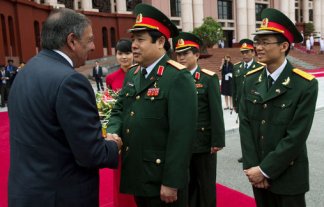 These insights paint a vivid picture of Vietnam’s potential in dealing with Chinese hegemony. Of the many countries in Asia at this point in time, Vietnam remains the key obstacle against Chinese expansionism. As a result, the U.S. continues to pursue better relations with the country. Unfortunately, these warming relations comes at the cost of human rights in Vietnam. To keep Vietnam from running into the arms of the Chinese, the United States must turn a blind eye to the atrocious human rights record of Vietnam. This is the American dilemma. In order to keep U.S.-Vietnam relations on the right track, the United States is forced to soften its stance on human rights.
These insights paint a vivid picture of Vietnam’s potential in dealing with Chinese hegemony. Of the many countries in Asia at this point in time, Vietnam remains the key obstacle against Chinese expansionism. As a result, the U.S. continues to pursue better relations with the country. Unfortunately, these warming relations comes at the cost of human rights in Vietnam. To keep Vietnam from running into the arms of the Chinese, the United States must turn a blind eye to the atrocious human rights record of Vietnam. This is the American dilemma. In order to keep U.S.-Vietnam relations on the right track, the United States is forced to soften its stance on human rights.
Nonetheless, this reality outlines the importance of Vietnam’s role in dealing with Chinese hegemony in the South China Sea. Vietnam can very well be the difference maker in China’s success or failure in this territorial dispute, and has the power to counter China’s influence in Southeast Asia. America understands this, and Vietnam understands this. This is one major reason why the two countries have become so close in recent years, with an increasingly nervous and aggressive China on the periphery. Though the human rights abuses continue to cause friction between Vietnam and the U.S., the China issue continues to bring the two closer together.
Posted in Current Events, Editor's Note with tags Benigno Aquino, China,Philippines, Sca
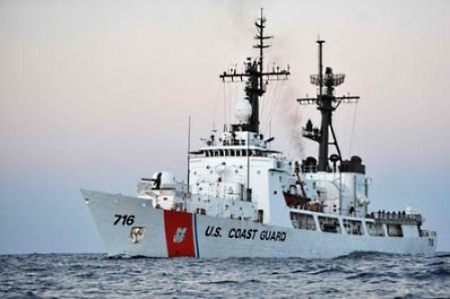 Tensions have been flaring between the Philippines and China over a topic we know all too well: sovereignty in the Southeast Asia Sea. As China continues to pursue its rapacious claims over the entire sea in Southeast Asia, one country has stepped up to challenge the Asian giant’s “indisputable” claims of “indisputable” sovereignty, which, along with every other claim China is making, are “indisputable.” This gutsy contestation comes from China’s little neighbor to the east, the Philippines.
Tensions have been flaring between the Philippines and China over a topic we know all too well: sovereignty in the Southeast Asia Sea. As China continues to pursue its rapacious claims over the entire sea in Southeast Asia, one country has stepped up to challenge the Asian giant’s “indisputable” claims of “indisputable” sovereignty, which, along with every other claim China is making, are “indisputable.” This gutsy contestation comes from China’s little neighbor to the east, the Philippines.
The incident began in early April, when Filippino authorities spotted eight Chinese naval vessels stationed near the Philippines’ Scarborough Shoal. What followed was a four day standoff between the Philippines and China near Filippino territory, from the identification of the Chinese ships on 6 April 2012, to the near detainment of these vessels on 10 April 2012. To this day, the diplomatic crisis between China and the Philippines remains
China’s government and state-run media agencies continue to threaten the Philippines with economic and military retribution if the country continues to resist the assertions of the PRC. China has increased, and continues to increase, the number of military vessels deployed near the disputed Scarborough islands, which the Chinese call Huangyan. Tourism from China to the Philippines have been blocked, and the Chinese Embassy in Manila continues to accuse the Philippines of violating China’s “indisputable” sovereignty.
 Meanwhile, the Filippino people have gathered in protest outside of the Chinese embassy, sending their message to the Chinese government. They carry with them signs saying “Stop Chinese Aggression Now!”, “China Back Off!”, and the like. The Philippines government has also taken a tough stance against the PRC, standing by their people in the face of Chinese aggression. The country has made military purchases in preparation of armed conflict with the PRC. Weapons have been purchased from the U.S., with further transactions planned with Japan and South Korea.
Meanwhile, the Filippino people have gathered in protest outside of the Chinese embassy, sending their message to the Chinese government. They carry with them signs saying “Stop Chinese Aggression Now!”, “China Back Off!”, and the like. The Philippines government has also taken a tough stance against the PRC, standing by their people in the face of Chinese aggression. The country has made military purchases in preparation of armed conflict with the PRC. Weapons have been purchased from the U.S., with further transactions planned with Japan and South Korea.
Even with these new military expenditures however, the Philippines will still be no match for China in terms of military capability. The People’s Republic of China exponentially dwarfs the Philippines in military spending. Materially, the Philippines does not stand a chance against China, the giant to the west. That being said, the Philippines has taken the necessary steps to defend the rights of their people. Though they are outclassed and outnumbered, the Philippines refuse to bow down to the demands of a foreign bully, putting them leaps and bounds above the Communists in Vietnam.
Unlike the Communists in Vietnam, who refuse to stand up to the terrorist activities of the Chinese navy, the Philippines is not afraid to speak out. When the Chinese military kidnapped and terrorized the fishermen of Vietnam, the VCP remained silent on the matter for months at a time. Any attempt by the people of Vietnam to stand up for their fellow Vietnamese were met with heavy repression by the Communist Party in Vietnam. Even the brief protests permitted by the Vietnamese government last summer have been quashed for fear of a vengeful PRC. Put simply, Filippino President Benigno Aquino has resoundingly accomplished what Nguyen Tan Dung was too cowardly to follow though with.
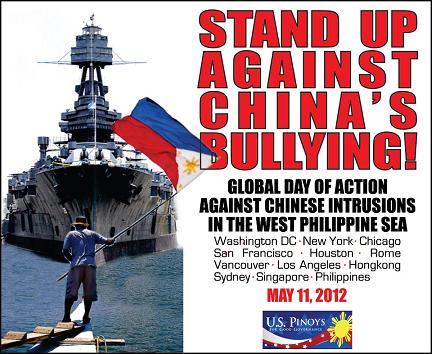 China may be stronger than the Philippines for the time being, but the Philippines has the world on its side. The Filippino people are fully in support of their government in defence against China, and continue to do so with no hesitation. Furthermore, the basis of the Philippines arguments are based on international law, which follow the guidelines of the international community. China’s rebuttal of “indisputable” historical claims remain to be proven, with the recurring term “indisputable” as their only source of defence. As long as the Philippines stays firm in defence of its people, China will have a very difficult time in Southeast Asia.
China may be stronger than the Philippines for the time being, but the Philippines has the world on its side. The Filippino people are fully in support of their government in defence against China, and continue to do so with no hesitation. Furthermore, the basis of the Philippines arguments are based on international law, which follow the guidelines of the international community. China’s rebuttal of “indisputable” historical claims remain to be proven, with the recurring term “indisputable” as their only source of defence. As long as the Philippines stays firm in defence of its people, China will have a very difficult time in Southeast Asia.
Chariots of Fire
I see a young Tibetan covered in flames
Face severely burnt and fingers clamped together
Yet his feet are running forward like chariots of fire
Is his pain unbearable? - Absolutely!
He also has to endure a greater pain
The pain of losing his homeland
He thus transforms his body to a forceful storm
Wipe out the invading enemies and rebuild his country
Our young Tibetan man, you are not fighting alone
Along the road raise high the Yellow flags
Ensure that Vietnam will always march together
With Tibet toward freedom
We are there with you to light a flame of determination
Lighting up the roads ahead for the immortal hero
LêQuangHồng (Translation by Nguyễn Kỳ Hưng)
Chariots de feu
Je vois un jeune Tibétain couvert de flammes
Le visage grièvement brûlé, les doigts crispés,
Mais ses jambes courent comme des chariots de feu
Sa douleur est-elle insupportable ? –Totalement !
Une plus grande douleur cependant s’est abattue sur lui,
La douleur de perdre son pays
Il transforme ainsi son corps en un puissant ouragan
Anéantit ses ennemis qui l’envahissent et reconstruit sa patrie
Ô notre jeune homme tibétain, tu ne te bats pas seul
Le long de la route, les drapeaux d’or de la terre vietnamienne
Assurent que le Vietnam marchera toujours
Nous sommes là, avec toi, pour allumer la flamme de la résolution
Eclairant la route de l’avenir pour le héros immortel
LêQuangHồng














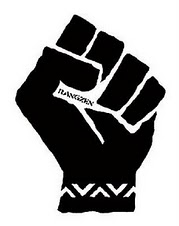
No comments:
Post a Comment